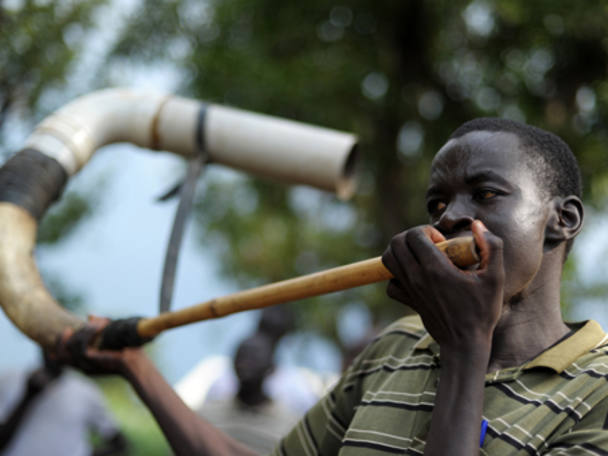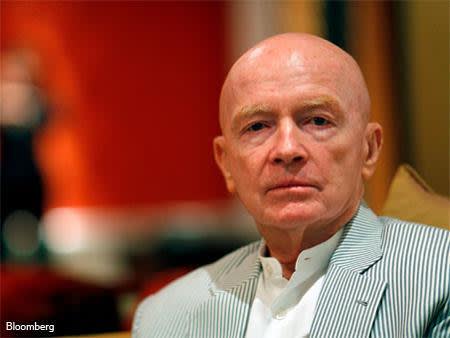Dr. Mark Mobius can be likened to a latter day Phileas Fogg, travelling across the world's emerging and frontier countries much like the fictional character in Jules Verne's novel circumnavigated the late Victorian world. When I eventually manage to track him down over a very static phone line to Hong Kong, he is packing his bags for Poland, after that it's Russia, then Romania and so the list goes on. The veteran investor admits that he calls "some hotel room" home. Not bad going for a 75-year old and Dr. Mobius has no plans of slowing down: "I am not planning to retire any time soon – it's still too much of a challenge."
The latest challenge Dr Mobius is taking on is the new Templeton Africa Fund which will seek long term capital growth by investing across the continent and in companies which have their principal business activities in Africa.
For compliance reasons, Dr. Mobius is reluctant to talk about specific stocks, although he says some of the holdings in the Templeton Frontier Markets fund gives a good flavour of what he is buying for the newly launched fund.
On a sector level banking is probably the biggest play. "Banking in Africa is growing at a torrential pace and provides an opportunity to get exposure to the consumer sector," he says, highlighting the fact that most people in Africa do not have bank accounts leaving an incredible potential for growth. He also likes telecoms, natural resources and, as income levels rise across the continent, consumer products. "We want to get exposure before the multinationals come in – in the more developed emerging markets you will notice that multinationals have already come in and grabbed a large market share, gobbling up smaller local companies."
With expectations that Africa will grow more than 7 per cent annually over the next 20 years, Templeton's new proposition seems like a no-brainer. But with Africa's stock markets still small and very illiquid, are there really enough investment opportunities to warrant a pure play Africa fund? Dr Mobius thinks so. "There is enough in there – in Africa – for us to get exposure to. As a matter of fact we now have well over US$300mn in our frontier funds in Africa. It's changing every day with more and more companies coming to the market."
He adds that market illiquidity is not necessarily a disadvantage. "If you're careful with your stock selection you can benefit from the fact that a lot of liquidity is not reflected in the statistics of stock markets. There is a lot of off market trading – very often we will get strong positions in companies we like and hold them until such time as other investors get interested and then sell at a premium."
But does it really make sense for Templeton to have raised so much money in its frontier fund and now still raise money for an Africa fund? Will it not make more sense for an investor to get exposure to the continent's growth story via a diversified frontier markets fund, considering that the majority of holdings are likely to be in Africa anyway? "I think the main reason why people are interested in this fund is because they see the potential for more alpha – the possibility of getting a better return even than in the frontier fund. Africa is growing very fast – in the last decade six of the 10 fastest growing countries were in Africa. The continent is starting from a much lower base and admittedly there are more difficulties, but the growth possibilities are very high," responds Dr. Mobius.
Of course, the idea of an Africa-focused fund is not new – New Star tried it back in 2008 and failed dismally and if you trawl the funds space you will come across around 40-plus funds focused on the continent. In fact the number of Africa funds has grown so much in recent years that consolidation among the plethora of smaller, less liquid pioneer funds seems inevitable. Dr. Mobius agrees: "You have got to watch the closed-ended space because if there are big discounts in that asset value, then the arbitragers will be in there and wanting to close some of those funds. So you might get some falling by the way side. But I don't see why there will be consolidation in the open-ended space unless one management company takes over another. There are a lot of old timers that have been running Africa funds for a long time and finally their day has come – so there's no reason for them to get out at this stage."
| CV: DR. MARK MOBIUS |
|---|
Mark Mobius is executive chairman of the Templeton Emerging Markets Group, and manages their funds including the Templeton Emerging Markets Investment Trust, which he has run since inception. He has worked at Templeton since 1987. He has bachelors and masters degrees from Boston University, and a PhD in economics and political science from the Massachusetts Institute of Technology. |
Fair enough – but why would someone invest in the new Templeton Africa Fund if they can invest with one of these so-called 'old timers' that have a track record to boot? Dr. Mobius argues that the size and strength of the Franklin Templeton brand means its research capabilities are second to none. "We have over 50 investment professionals supporting our global research. We are a brand name and we have got tremendous support – legal, accounting – you name it, we've got it. We also have a strong custodial network – in some of these countries the smaller asset managers find it difficult to find a custodial bank to open up the market for them and many funds run into difficulty as a result."
Tied to the strength of the Templeton brand is Dr. Mobius himself, who given his stellar track record, no doubt helps draw in investors. But this also opens up the thorny issue of key man risk – what happens if Dr. Mobius leaves? "I don't think there is a concern and I don't expect there to be any disruption. On all our funds we use teams of people that really run the fund on a day-to-day basis so it's not dependent on me – I am not sitting there picking the stocks. There are teams of people and then I supervise it. And given the level of experience of the team - any one person can step in, at any time." For now though, it seems Dr. Mobius has no intention of handing over the reins.












